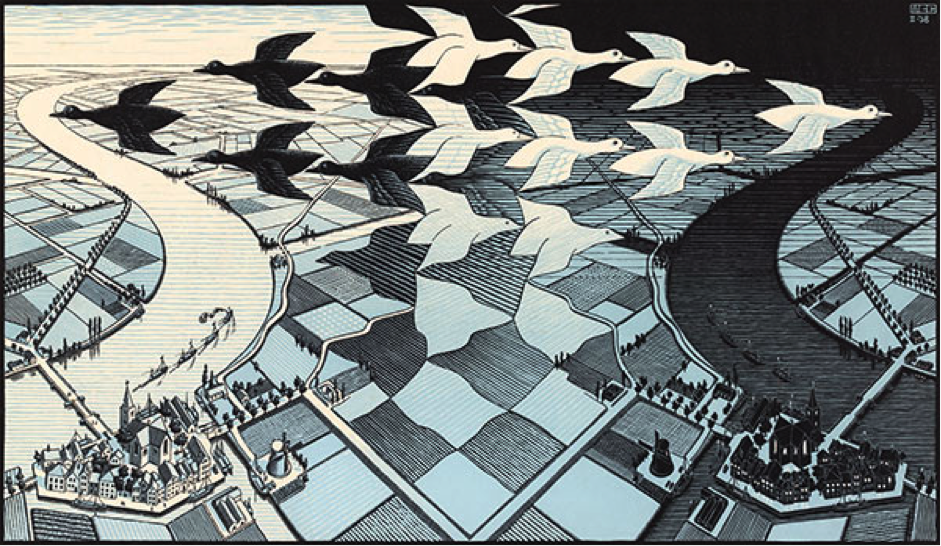Once in awhile, it is good to meditate on this idea while observing the starlit night sky, to feel how rare in the universe is a living planet with light and sounds, and living entities with eyes and ears and hands and minds.
The vast universe in which we abide is dark, silent, devoid of color and sound, almost empty. The bright stars, solar systems, and galaxies that are scattered in its vast spaces are but an infinitesimal part of its body – which is largely the empty space between them. It took the crew of Apollo 11 three whole days of travel in this cold, dark emptiness to reach our nearest celestial neighbor, the moon. When they finally landed on it, they discovered that the moon was just as cold and empty as the space surrounding it.
The substratum in which each object of the universe is situated is a limitless void of empty space. Yet, little specks of light are scattered throughout this almost infinite darkness, which we call stars. And around these fiery objects revolve some planets, on whom little pieces of matter, and elements, and rocks reside. And on an extremely small percentage of these objects, the rarest thing in the cosmos one day appears: some living organism that comprehends and reacts to its environment. We are the rarest “objects” in the universe. Even if we assume there are other planets with life in the universe, still these are so rare and such an infinitesimal minority. We are the exception in the universe, almost an anomaly.

Every day that the sun rises, it extinguishes not just the night here on Earth, but also the Grand Night that permeates the universe. Day cancels night in a miraculous event that we all witness once every twenty-four hours. Furthermore, man, on a much smaller scale, has acquired the ability to cancel this grand night: each time we switch on the lamp to read at night, we somehow vanquish the ubiquitous darkness of interstellar space. Here, in this little inconspicuous corner of the galaxy, there is a being that seems to contradict the normal state of the cosmos: Although the universe is permeated by darkness and silence, the Earth and man’s life on it is full of light and sounds. Light shines upon every landscape I enjoy, every human structure I encounter, every face that smiles at me. Sound creates a depth to everything that is lit – the breeze is the sound of Nature, the cicadas is the background music of Life, the human voice is the miraculous expression of the Soul.
It is good to experience our uniqueness by pondering on the simple fact that, while the universe is dark, empty, silent, and cold, we here now enjoy innumerable sights, sounds, smells, and feel the warm rays of the sun on our skin.
Furthermore, every creation of man is a novelty in this vast emptiness. The computer on which I now type these lines is the rarest object in the universe. An imaginary interstellar traveler might need to travel millions of light-years through empty space to first find a planet with life, then one with sentient beings, and then one where civilizations have arisen capable of playing with the elements and forces of nature in such a way as to create this technology.
Once in awhile, it is good to meditate on this idea while observing the starlit night sky, to feel how rare in the universe is a living planet with light and sounds, and living entities with eyes and ears and hands and minds. Entities who can relate to the world via their senses, create and handle objects with their hands, and comprehend both the universe and themselves with their minds. It is good to experience our uniqueness by pondering on the simple fact that, while the universe is dark, empty, silent, and cold, we here now enjoy innumerable sights, sounds, smells, and feel the warm rays of the sun on our skin. And while we move about on this planet, we also come to feel the warmth of other people, look in their eyes, hear their strange voices, and exist as part of this extraordinary and rare occurrence in the universe.

Nicos Hadjicostis is a writer, world-traveler, and former media executive. His award-winning book, Destination Earth – A New Philosophy of Travel by a World-Traveler, is the result of a six-and-a-half-year around-the-world journey during which he treated the world as if it were one huge country, a single destination. To read more, and subscribe to his bi-weekly Tuesday Letters, visit his website.
